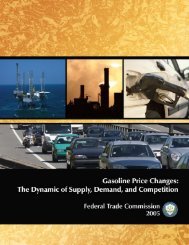Plaintiff Federal Trade Commission's Motion for an Order to Show ...
Plaintiff Federal Trade Commission's Motion for an Order to Show ...
Plaintiff Federal Trade Commission's Motion for an Order to Show ...
You also want an ePaper? Increase the reach of your titles
YUMPU automatically turns print PDFs into web optimized ePapers that Google loves.
defend<strong>an</strong>ts sell a continuity program. Low program usage, rapid c<strong>an</strong>cellations, <strong>an</strong>d a large<br />
volume of refund dem<strong>an</strong>ds <strong>an</strong>d consumer complaints provide clear, convincing evidence that<br />
the defend<strong>an</strong>ts have misrepresented what they sell in violation of Paragraph I.A of the <strong>Order</strong>.<br />
“Advertising deception is evaluated from the perspective of the . . . reasonable<br />
consumer in the audience targeted by the advertisement.” FTC v. Wash. Data Resources,<br />
856 F. Supp. 2d 1247, 1272 (M.D. Fla. 2012) (“Advertisements must be considered in their<br />
entirety, <strong>an</strong>d as they would be read by those <strong>to</strong> whom they appeal.”). Here, the defend<strong>an</strong>ts<br />
have targeted consumers who just applied online <strong>for</strong> a cash adv<strong>an</strong>ce or lo<strong>an</strong>, telling them,<br />
“[w]e have received your accepted lo<strong>an</strong> application <strong>an</strong>d you’ve been approved,” “Mongo was<br />
able <strong>to</strong> accept your lo<strong>an</strong> application,” or “Congratulations! You have been approved.”<br />
Their sites, such as “GetMy2500.com,” have emphasized terms like “$2,500” <strong>an</strong>d “Dollar”<br />
in large, bold print, often near images of money. In contrast, the defend<strong>an</strong>ts use fine print,<br />
un-bolded print, <strong>an</strong>d oblique references <strong>to</strong> obscure material terms of their real offer — a feebased<br />
continuity program with credit usable solely at the defend<strong>an</strong>ts’ mall <strong>an</strong>d other material<br />
restrictions. Fin<strong>an</strong>cially distressed consumers applying <strong>for</strong> lo<strong>an</strong>s have reasonably interpreted<br />
the defend<strong>an</strong>ts’ calls <strong>an</strong>d websites as offering a cash adv<strong>an</strong>ce, lo<strong>an</strong>, or general line of credit.<br />
Indeed, “consumer interpretation in<strong>for</strong>ms whether a communication was deceptive,” id. at<br />
1273, <strong>an</strong>d consumers have widely complained they were misled by the defend<strong>an</strong>ts, <strong>an</strong>d then<br />
debited by them, when they really needed a lo<strong>an</strong>. See supra pp. 4-10; PX7 7(b)-(e); PX10<br />
23; PX10K passim. 11 Paragraph I of the Court’s <strong>Order</strong> <strong>for</strong>bids such deception.<br />
11 Similarly, in 2009, Florida’s Office of Fin<strong>an</strong>cial Regulation found MS LLC employed the “misleading”<br />
statement that it is a “registered lender” operating its business from Florida, PX10SS at 9, <strong>an</strong>d denied its<br />
application <strong>for</strong> a license as a consumer fin<strong>an</strong>ce comp<strong>an</strong>y <strong>for</strong> that <strong>an</strong>d other reasons. Id. at 1-2, 9.<br />
15
















